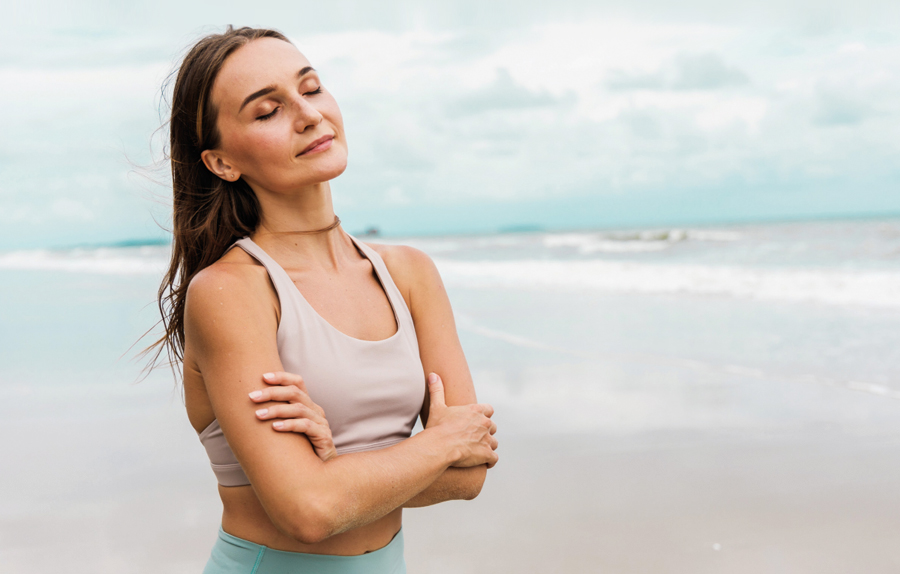
More realistic health resolutions you can stick too from Kerry Parnell 10. Recruit an exercise buddy
10. Recruit an exercise buddyIf you want to stick to a new fitness resolution, teaming up with somone who shares the same goal will help motivate both of you to stay on track. Whether you go to an exercise class or just walk together, you are far less likely to give up. ‘A support system, such as a workout buddy or a friend with similar health ambitions, will help keep you accountable,’ says Glenn Cross, the chairman of EZZ Life Science (ezzlife.com.au).
‘By prioritising your routines and integrating them into your daily lives, you’re both more likely to stick to your schedules in the long run.’
11. Breathe deeply for better digestion
Anyone who suffers from digestive problems will love this resolution.
Breathing deeply into your diaphragm is one of the best-known techniques for shifting the body from distress-mode to relax-mode, says clinical psychologist Dr Tracey Zielinski. If you build in breathing exercises at the beginning of each meal, your digestion will thank you. ‘Your digestive system is designed to work most effectively when you are relaxed,’ she says. ‘If you eat while you are stressed or anxious you are much more likely to experience acid reflux or indigestion.’ She advises taking slow, deep breaths before you eat. ‘The other benefit is that you will eat more slowly and enjoy your food more.’
12. Enjoy a short exercise ‘snack’
While many of us launch ourselves into new exercise programmes every January, the best way of integrating more fitness into your life without noticing is to have an exercise ‘snack’ - short, sharp routines that fit into your daily life. ‘Mini-workouts have been proven to offer the same benefits as one continuous routine,’ says personal trainer Rachael Sacerdoti of It’s So Simple (itssosimple.co.uk). She suggests 12 repetitions of exercises such as frog jumps, burpees or high-knee lifts.
13. Get yourself straightened out
As we get older it seems inevitable that our posture changes for the worse, but the good news is that it’s never too late to correct it. Bad posture, such as slumped shoulders and a rounded spine, can cause back and neck pain, headaches and even trouble breathing. An easy way to start is by doing some simple yoga poses for a few minutes each day. One of the simplest is the mountain pose. ‘Stand with your feet hip-width apart, with your arms hanging down at your sides. Stretch through your arms and slowly bring them up above your head,’ says yoga-teacher Yasmin El-Saie. ‘Feel your shouldersrolling back and your head balancing freely on your spine. Hold for a few breaths and return your arms to the starting position.’
14. Enhance your hearing
We take our hearing for granted, but this year, listen to your ears, says Peter Byrom (peterbyrom.co.uk). ‘Flex your hearing muscles by sitting in a quiet space and honing into a distant ambient sound. Training your hearing to focus in on a particular noise will make your hearing more precise,’ he says. ‘The more you do this, the sharper your hearing will be. If you are overexposed to sound and overstimulated the majority of the time, your ears not only won’t have time to rest, but they’ll also become less sensitive to sound.’
15. Pile on the protein
‘My top tip for anyone over the age of 50 is to ensure they consume protein with every meal,’ says registered dietitian Zoe Cottrell. ‘Forget about the scales - being strong is much more important than being skinny, and protein plays an important part in maintaining muscle mass and supporting overall health,’ she says.Good sources of protein include dairy, fish, meat, eggs, beans, legumes, nuts and seeds. You can track your intake with a calculator like the one at www.provytl.com.
16. Test yourself
It has never been easier to monitor health conditions thanks to the availabilty of at-home testing kits. So there’s no excuse this year - you can keep on top of everything, from cholesterol to iron levels, through your GP, but also do it yourself if you want more frequent results. ‘It’s important to ensure we monitor health conditions like cholesterol by speaking to a doctor, but you can also use at-home products such as MyHealthChecked’s cholesterol profile test,’ says GP Dr Dave Nichols.
17. Spend time lending a hand
Another excellent resolution is to give more of your time to volunteering, because it will bring you big rewards, too. ‘Not only is it a great way of connecting with and meeting people, it helps to create a sense of purpose in our lives,’ says Dr Zoe Wyrko, wellbeing director at Riverstone Living. ‘Having a reason to get up, get going and get out and about has been proven by scientific studies to help us live longer and better,’ she says. ‘There are plenty of volunteering opportunities out there to suit everyone, whatever your skills and interests.’
 18. Sun safety
18. Sun safetyIt’s a common mistake to think you can go without SPF in the UK, says dermatologist Dr Eva Melegh. ‘Always wear a mineral SPF every day, summer or winter, either as a stand-alone cream or under make-up,’ she says. ‘Mature skin is drier, more fragile, more sensitive and more prone to UV-triggered skin conditions such as rosacea. I recommend a zinc mineral SPF such as Kalme Day Defence Cream SPF25.’
19. Look after your pearly whites
Give your dentist some good news by committing to flossing and brushing your teeth correctly at least twice a day. Dr Bharat Patel, CEO of London’s Dental Care Centre, says the first step is to get the right toothbrush. ‘Everyone’s gums are different. Some people are sensitive to hard bristles, while others find that soft ones aren’t strong enough,’ he says. ‘Have a toothbrush that works well and doesn’t cause you any pain.’
 20. Keep your bones strong
20. Keep your bones strongIt is vital that women over 50 get enough calcium in their diet to prevent osteoporosis. You need 700mg a day, and calcium-rich foods include dairy products, leafy greens, dried-fruits, sardines, almonds, sesame seeds and tofu. The Royal Osteoporosis Society (theros.org.uk) has launched an online risk checker to help. ‘I urge everyone to check their risk. It takes less than five minutes and could change your life.’ says GP Dr Amir Khan.







